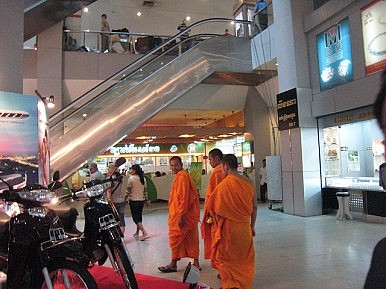 |
| Image Credit: Trans World Productions via Flickr |
Cambodia Heads Upmarket with Style and Hun Sen
The Diplomat | July 08, 2014
A gleaming, Western style, Japanese-owned mall has just opened in Phnom Penh, and within a few weeks Rolls Royce will add its name to the list of high-end car manufacturers with a showroom in the Cambodian capital.
Of course, there are hundreds of malls and auto dealerships
across Southeast Asia, and Cambodia should be forgiven for coming late
to the party on brand name addictions, given its decades of wars and
political upheaval that ended almost a generation ago.
However, during the opening of the Aeon Mall, Prime Minister Hun Sen could not resist the temptation to indulge in some of
his usual rhetoric, warning a youthful audience with shopping bags of
their latest purchases that the mall would be no more if peace and
stability could not be maintained.
“Please, all youths, try to work hard for the success of the mall. If
Aeon does not make profits, the mall bosses will not increase your
salaries,” he said, adding “There is no need to protest to destroy the
mall … don’t become good at protesting or create any protests that will
make Aeon shut down.”
[Desperate times demand desperate measures]
Hun Sen was speaking as the mall was inaugurated, alongside Japanese Foreign Minister Fumio Kishida. Hun Sen was adamant about the $205 million Aeon Group investment.
“Will anyone go to shop at Aeon Mall if the country is war-torn or
when there is anarchy on the streets of the capital? There will be no
one. Only peace and national reconciliation as well as political
stability are the factors that serve the development of the country,”
the prime minister added.
Hun Sen, whose popularity is on the wane, has been persistent with
such threats. They have also been on the increase since his Cambodian
People’s Party (CPP) suffered a dramatic reduction in its parliamentary majority during last year’s election.
Perhaps his most adamant point regarding politics and protests was
“Don’t play such things. If Mr Kishida returns back home, he will not
die. But our 2,500 employees will die from losing their jobs. That’s the
way it is.”
To suggest that the typical upmarket shopper is about to trade her
purse for unruly street demonstrations is to misunderstand the
sophistication of younger Khmers, and why they have en-masse favored the
opposition Cambodian National Rescue Party (CNRP).
The notion that war is plausible and puts the latest fashion items at
risk is far-fetched. Equally unfathomable among the overwhelming
majority of extremely poor Khmers, is the idea of someone paying more
than $400,000 dollars for a Rolls Royce Phantom.
Hun Sen and his coterie of wealthy businessmen
have been criticized for ignoring the expectations of Cambodia’s young,
which have little or no memory of war. The days when winning votes
meant trips into the countryside handing out cartons of cigarettes and
bags of rice are gone.
Sixty-eight percent of the population are under 30 years old and
demanding iPhones, motorbikes, an education and jobs, and the CNRP has
gained popularity through protests following last year’s poll amid
claims of electoral fraud.
Its boycott of parliament is almost a year old.
However, more importantly, threats of war are unlikely to win over
the younger vote, which is desperately needed if the CPP is to win in
2018.
Malls don’t shut down during coups in Thailand, protests in
Indonesia, bombings in the Philippines, or crackdowns on dissidents in
Vietnam. If Hun Sen is serious about improving his standing with the
wider voting public, then he might consider using fewer threats, and a
more equitable distribution of the nation’s wealth.


No comments:
Post a Comment